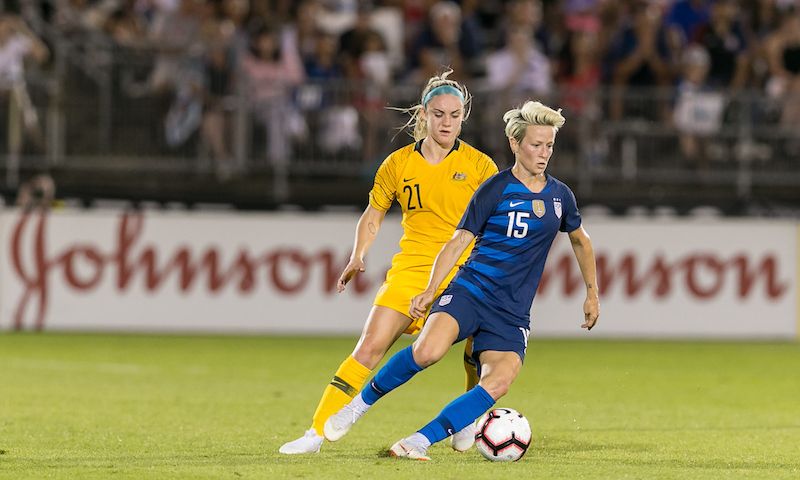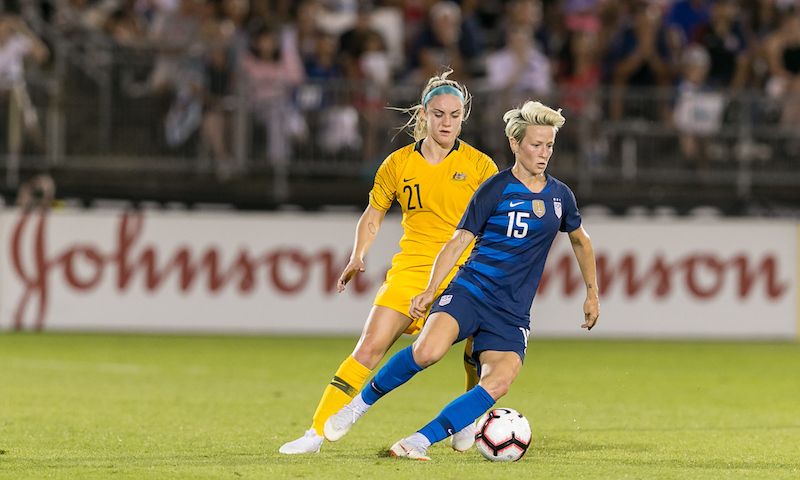Five Things to Know About Australia
The match brings together two countries that are widely considered to be among the favorites to win the 2019 FIFA Women’s World Cup this summer.



TheU.S. Women’s National Team will play its sixth game of the “Countdown to the Cup” when it takes on burgeoning rival Australia on April 4 at Dick’s Sporting Goods Park (7 p.m. MT on FS1). The match, which is likely to be a sell-out at the 18,000-seat venue, brings together two countries that are widely considered to be among the favorites to win the 2019 FIFA Women’s World Cup this summer.
AUSTRALIA WOMEN’S NATIONAL TEAM ROSTER BY POSITION
GOALKEEPERS (3):
1-Lydia Williams (Reign FC, USA), 12-Teagan Micah (UCLA, USA),
18-Mackenzie Arnold (Brisbane Roar FC)
DEFENDERS (8):
2-Gema Simon (Newcastle Jets FC), 4-Clare Polkinghorne (Houston Dash, USA),
5-Laura Alleway (Melbourne Victory FC), 7-Steph Catley (Reign FC, USA),
14-Alanna Kennedy (Orlando Pride, USA), 21-Ellie Carpenter (Portland
Thorns, USA), 22-Elizabeth Ralston (Sydney FC), 23-Teigen Allen (Melbourne
Victory FC)
MIDFIELDERS (6):
3-Aivi Luik (Levante UD, Spain), 6-Chloe Logarzo (Washington Spirit, USA),
8-Elise Kellond-Knight (Reign FC, USA), 10-Emily Van Egmond (Orlando Pride,
USA), 13-Tameka Butt (Klepp Il, Norway), 19-Katrina Gorry (Brisbane Roar
FC)
FORWARDS (6):
9-Caitlin Foord (Portland Thorns FC, USA), 11-Lisa De Vanna (Sydney FC),
15-Emily Gielnik (Melbourne Victory FC), 16-Hayley Raso (Portland Thorns,
USA), 17-Mary Fowler (Bankstown City Lions FC), 20-Sam Kerr (Chicago Red
Stars, USA)
Australia’s team also includes Lydia Williams (Reign FC), who has 76 caps, and was at times the best goalkeeper in the league last season, and Ellie Carpenter of the Portland Thorns, who is the youngest player to play in the NWSL. She made her debut on May 9, 2018 on the road against Houston at 18 years, 12 days. She is also the youngest player to score in the NWSL, tallying on May 19, 2018 on the road against Washington Spirit at age 18 years, 22 days.
Australia played two games in Europe against teams ranked in the top-four in the world in October of 2018, losing 2-0 to France and tying England, 1-1. A two-game series vs. Chile in November of 2018 produced a surprise 3-2 loss followed by a 5-0 win. Most recently, Australia hosted the FFA Cup of Nations, which it won, defeating three World Cup-qualified teams in New Zealand (2-0, goals from Emily Gielnik & Hayley Raso), Korea Republic (4-1, goals from Sam Kerr 2, Lisa Devanna, Emily Gielnik) and Argentina (3-0, goals from Sam Kerr, Alana Kennedy, Caitlin Foord).
After missing the inaugural Women’s World Cup in 1991, Australia have now qualified for seven successive Women’s World Cup tournaments and have grown into one of the top teams in the world. China 2007 was a breakthrough of sorts as Tom Sermanni’s side reached the knockout stage for the first time, where a Marta-led Brazil team edged the Matildas. Germany 2011 saw a repeat QF appearance following a group-stage victory vs. Norway. Australia stepped up another level four years later in Canada with a Round of 16 win over Brazil, in what was their first knockout-stage victory, but then fell to Japan, 1-0.
Australia appointed Ante Milicic as the new head coach less than two weeks before they hosted the inaugural FFA Cup of Nations in the February/March FIFA window. Milicic was an assistant coach for the Socceroos – Australia's men's team – at the 2014 and 2018 World Cups, as well as an assistant and head coach for the Australia U-20 and U-23 MNTs but had never coached a women's team. As striker and consistent goal scorer, he had a long professional career, mostly in Australia, but also in Holland and China.
The Government noted the potential economic benefits of hosting the Women's World Cup, with the 2015 edition in Canada attracting more than a million spectators and a global TV audience of more than 760 million viewers. Sydney, Melbourne, Brisbane and Canberra would be expected to host the 24-team tournament, which will feature 52 matches, with each city having staged fixtures in the men's AFC Asian Cup in 2015. Australia hosted the highly successful Olympic soccer tournaments for men and women in 2000.